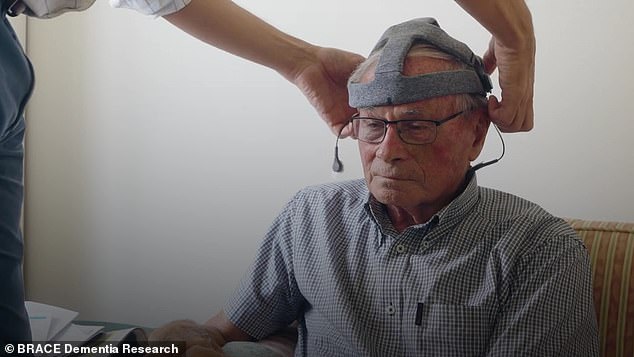[ad_1]
A three-minute test can detect signs of concerning memory problems linked to Alzheimer’s disease years before doctors typically diagnose the condition.
Fastball, an inexpensive tool that scans a patient’s brainwaves, showed for the first time that this type of test could be conducted at home and could reliably reveal signs of mild cognitive impairment (MCI), a condition that sometimes leads to Alzheimer’s.
Researchers from the University of Bath in England have been working on the affordable diagnostic cap for years, with their latest clinical trial successfully detecting amnestic MCI, a form of significant memory loss.
The study found that people with amnestic MCI had much weaker brain responses on the Fastball test compared to healthy adults and those with non-amnestic MCI.
Researchers said that Fastball is a promising, simple, and non-invasive way to check memory in people with early signs of MCI without a doctor or specialist.
In the US, approximately 7.2 million people over the age of 65 are living with Alzheimer’s disease, the most common form of dementia.
The study authors warned that early detection is vital because patients often don’t know they have the degenerative condition until symptoms like memory loss, confusion, and trouble communicating become apparent years or decades later.
Dr George Stothart, a cognitive neuroscientist at the University of Bath, said: ‘We’re missing the first 10 to 20 years of Alzheimer’s with current diagnostic tools.’

Volunteer John Stennard (pictured) was fitted with the Fastball brain scan device, which tests for signs of mild cognitive decline

Fastball is said to detect memory decline far earlier and more objectively, using a quick and passive test
Researchers, who published their work in the journal Brain Communications, worked with 53 MCI patients and 54 healthy older adults from memory clinics in the UK.
They split the MCI group into those with memory issues (amnestic MCI) and those without (non-amnestic MCI) based on a memory test score.
Participants then took part in a three-minute Fastball task where they watched pictures on a screen as they passed quickly while wearing an electroencephalogram (EEG) cap, which recorded their brain’s automatic reaction to the familiar images.
An EEG test uses small sensors placed on the scalp to record the brain’s electrical activity, helping doctors see how the brain is working.
Fastball fit over the heads of participants like a knitted hat, holding the sensors inside without any heavy cords or devices hanging off the cap.
Everyone retested after one year to see if the results were consistent and to check for memory changes.
Among the MCI group, a few patients who later developed dementia had slightly lower Fastball scores at the start, suggesting it might predict worsening memory issues.
‘There’s an urgent need for accurate, practical tools to diagnose Alzheimer’s at scale. Fastball is cheap, portable and works in real-world settings,’ Dr Stothart added.

In the US, approximately 7.2 million people over the age of 65 are living with Alzheimer’s disease, the most common form of dementia
In 2021, when the Bath team published their initial test results using the Fastball cap, Stothart noted that the at-home test could take more than five years off the average age of diagnosis for Alzheimer’s patients.
Currently, doctors diagnose the neurological condition using a combination of tests to gauge cognitive decline.
These include blood tests, brain scans, memory tests, and other tasks that measure someone’s language skills and problem-solving abilities.
Unfortunately, researchers have said these tests are also prone to many biases and can be thrown off if someone has issues with anxiety.
The study authors also touted the benefits of the recently approved drug Aducanumab, the first disease-modifying treatment for Alzheimer’s disease.
By knowing that someone has the disease years before symptoms begin to develop, treatments like Aducanumab may help doctors slow the progression of Alzheimer’s before its memory-robbing effects become debilitating.
Dr Julia Dudley, head of research at Alzheimer’s Research UK, said: ‘Too many families face dementia without answers, with one in three people with the condition living without a diagnosis.’
Dr Dudley added that longer-term studies involving a larger group of patients will be needed to find out if this technology can predict how memory problems like MCI unfold over someone’s lifetime.
[ad_2]
This article was originally published by a www.dailymail.co.uk . Read the Original article here. .

